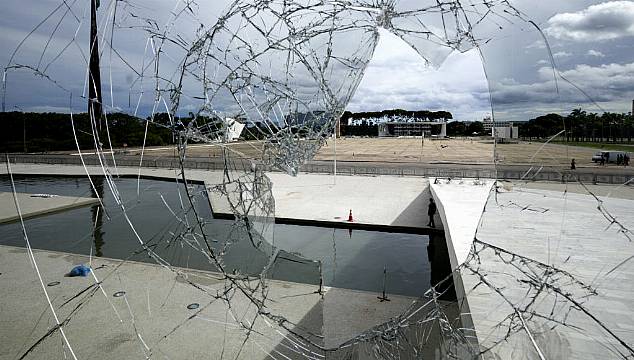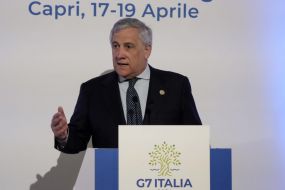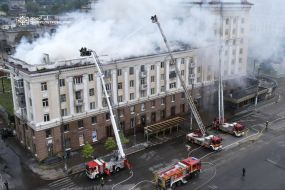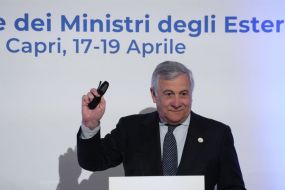Brazilian authorities have vowed to protect democracy and punish thousands of supporters of ex-president Jair Bolsonaro who stormed and trashed the nation’s highest seats of power.
In an unprecedented display for Latin America’s largest nation, protesters swarmed into Congress, the Supreme Court and presidential palace on Sunday.
Many of them said they wanted the Brazilian army to restore the far-right Mr Bolsonaro to power and oust the newly inaugurated leftist president, Luiz Inacio Lula da Silva.
It was a riot with striking similarities to the January 6 2021 insurrection at the US Capitol.
Police broke down a pro-Bolsonaro encampment outside a military building on Monday and detained some 1,200 people there, the justice ministry’s press office told the Associated Press (AP).

The Federal Police press office said the force already plans to indict roughly 1,000 people.
Mr Lula and the heads of the Supreme Court, Senate and Lower House also signed a letter on Monday denouncing the attack and said they are taking legal measures.
Justice minister Flavio Dino told reporters police have begun tracking those who paid for the buses that transported protesters to the capital.
Speaking on Monday at a press conference, he said rioters apparently intended for their displays to create a domino effect nationwide and they can be charged with a range of crimes, including organised crime, staging a coup and violent abolition of the democratic rule of law.
“We think that the worst is over,” Mr Dino said, adding the government is now focused on punishing lawbreakers and those who enabled them.
“We cannot and will not compromise in fulfilling our legal duties because this fulfilment is essential so such events do not repeat themselves.”
On Sunday, rioters wearing the green and yellow of the national flag broke windows, toppled furniture and hurled computers and printers to the ground.
They punched holes in a massive Emiliano Di Cavalcanti painting at the presidential palace and destroyed other works of art.

They overturned a U-shaped table where Supreme Court justices convene, ripped a door off one justice’s office and vandalised a statue outside the court.
The monumental buildings’ interiors were left in ruins.
Monday’s detainments came in addition to the 300 people who were arrested on Sunday during the riot.
Police were noticeably slow to react — even after the arrival of more than 100 buses — leading many to question whether authorities ignored numerous warnings, underestimated the protesters’ strength or were complicit.
Public prosecutors in the capital said local security forces were negligent at the very least.
A supreme court justice temporarily suspended the regional governor.
Another justice blamed authorities for not swiftly cracking down on budding neofascism in Brazil.
After his October 30 electoral defeat, Mr Bolsonaro, who has gone to Florida, has been stoking belief among his hardcore supporters that the electronic voting system was prone to fraud — though he never presented any evidence.
His politician son Eduardo Bolsonaro held several meetings with former US president Donald Trump, Mr Trump’s longtime ally Steve Bannon and his senior campaign adviser Jason Miller.

By early afternoon, the remaining Bolsonaro supporters dissipated as word spread that he was hospitalised in Florida with abdominal pain.
His condition was not clear but a photograph published by Brazilian newspaper O Globo showed him smiling from a hospital bed.
He has been hospitalised multiple times since surviving a stabbing in 2018.
A hospital spokesman did not immediately respond to a phone call and text message.
In a joint statement issued from Mexico City, US President Joe Biden, Mexican President Andres Manuel Lopez Obrador and Canadian Prime Minister Justin Trudeau condemned the attack “on Brazil’s democracy and on the peaceful transfer of power”.
Results from Brazil’s election — the closest in over three decades — were quickly recognised by politicians across the spectrum, including some Bolsonaro allies, as well as dozens of governments.
And Mr Bolsonaro surprised nearly everyone by promptly fading from view.
He neither conceded defeat nor emphatically cried fraud, though he and his party submitted a request to nullify millions of votes that was swiftly dismissed.
Since 1996, Brazilians have used an electronic voting system that security experts consider less secure than hand-marked paper ballots because the system leaves no auditable paper trail.
But Brazil’s system is closely scrutinised and domestic authorities and international observers have never found evidence of it being exploited to commit fraud.
Still, Mr Bolsonaro’s supporters refused to accept the results.

They blocked roads and remained camped outside military buildings, urging the armed forces to intervene.
Mr Dino, the justice minister, referred to the encampments as incubators of terrorism.
Protests were overwhelmingly peaceful but isolated threats — including a bomb found on a fuel truck headed to Brasilia’s airport — prompted security concerns.
Two days before Mr Lula’s January 1 inauguration, Mr Bolsonaro flew to the US and took up temporary residence in Orlando.
Many Brazilians expressed relief that, while he declined to participate in the transition of power, his absence allowed it to occur without incident.
Or so it had been, until Sunday’s havoc.
Analysts told the AP the upheaval could yield greater political support for Mr Lula and his stated mission to pacify the polarised country.
Many right-wing citizens and politicians were repulsed by Sunday’s scenes and eager to distance themselves from far-right radicalism.
The leader of Mr Bolsonaro’s own party called the uprising “an embarrassment”.

“This may have been the beginning of the end. The political system will want to isolate that radical movement and move away from it,” said Mario Sergio Lima, political analyst at Medley Advisors.
“I think what we will see now is the right trying to create new alternatives and new leaders, and the centre distancing itself.”
In a press conference from Sao Paulo state, Mr Lula read a freshly signed decree for the federal government to assume control of security in the federal district.
He said the so-called “fascist fanatics”, as well as those who financed their activities, must be punished. He also accused Mr Bolsonaro of encouraging the uprising.
Mr Bolsonaro repudiated the president’s accusation late on Sunday. Writing on Twitter, he said peaceful protest is part of democracy but vandalism and invasion of public buildings are “exceptions to the rule”.
Unlike the 2021 attack in the US, few officials would have been working in the top government buildings on a Sunday. Videos showed limited presence of the capital’s military police.
One video showed a group of protesters easily pushing through a police barricade, with only a few officers using pepper spray. Another showed officers standing by as protesters stormed the Congress, including one using his phone to record what was happening.

“This was a gross error by the federal district’s government,” said Thiago de Aragão, director of strategy at Brasilia-based political consultancy Arko Advice.
“Everyone knew they (the protesters) were coming to Brasilia. The expectation was that the federal district’s government was going to mount a response to protect the capital. They didn’t do any of that.”
Mr Lula said at his news conference there was “incompetence or bad faith” on the part of police and promised some will be punished.
Federal district governor Ibaneis Rocha confirmed on Twitter he has fired the capital city’s head of public security, Anderson Torres, hours before a Supreme Court justice suspended the governor from office, alleging “intentional omission”.







